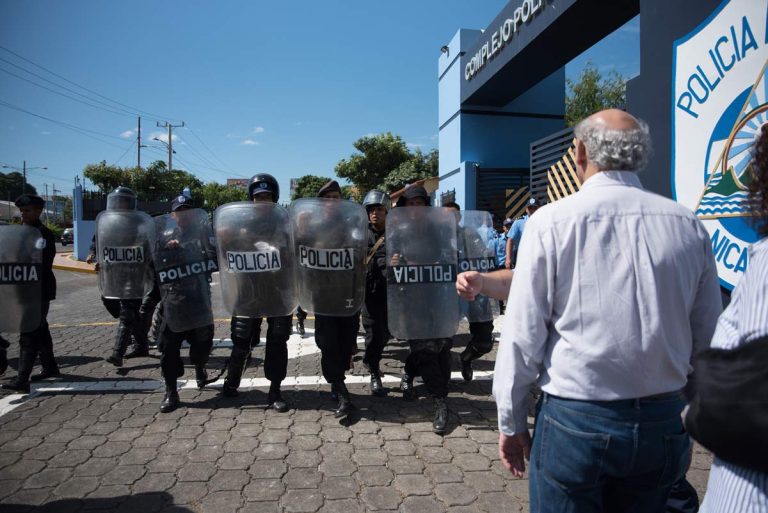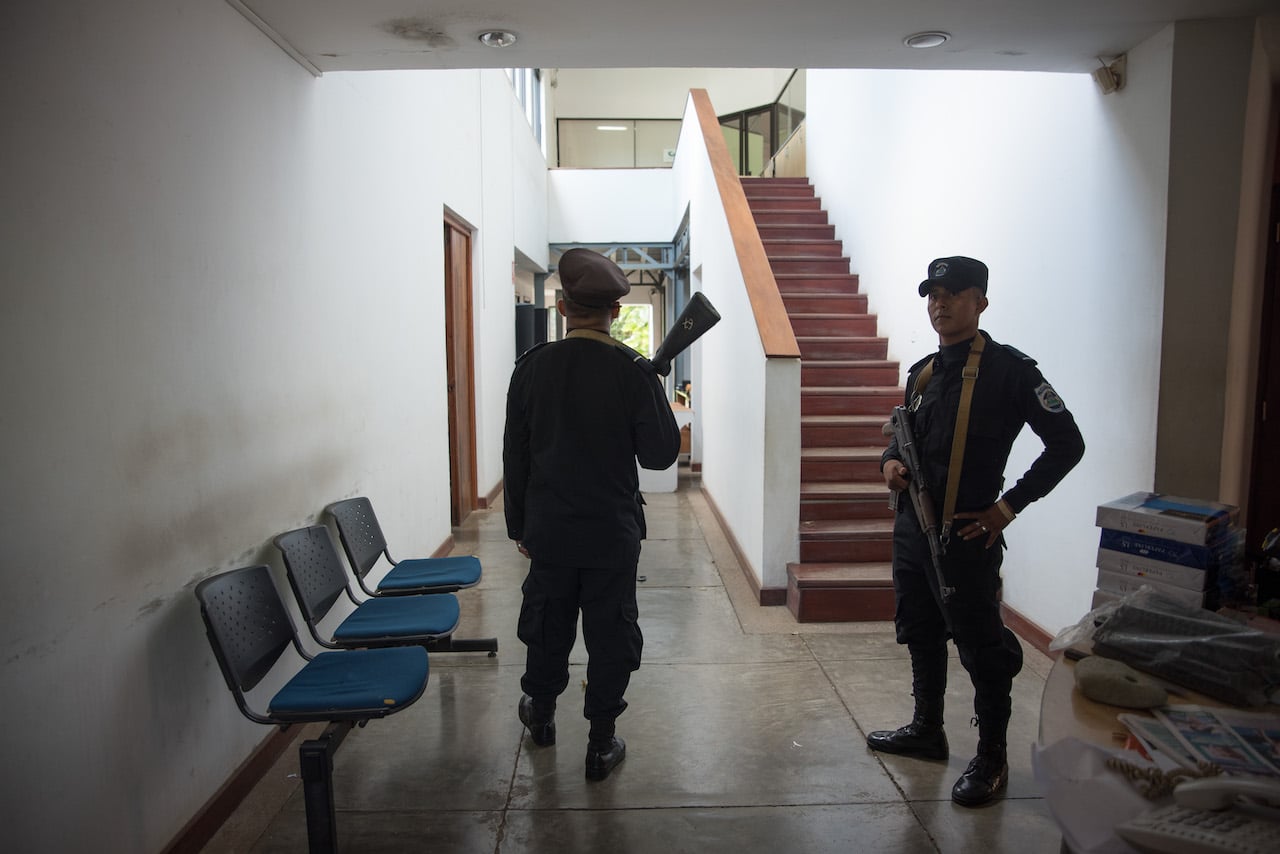13 de diciembre 2020

News About Sheynnis Palacios Not Covered by Media Operating in Nicaragua

PUBLICIDAD 1M
PUBLICIDAD 4D
PUBLICIDAD 5D
Two years after the assault, the regime maintains television censorship and the Supreme Court has not made a decision on the amparo appeals

Two years after the assault of Confidencial
Two years after the assault and occupation of the newsroom of Esta Semana and Confidencial, the Ortega regime maintains anti-riot agents inside the building, and exercises television censorship on Channel 12 and the cable system.
The police looted the facilities at midnight on Thursday, December 13, 2018. The journalistic team arrived in the morning on Friday, December 14, and found the disaster: they had taken 35 computers, seven television cameras, two editors, two photo cameras, dozens of hard drives, cell phones, audiovisual production accessories, accounting documentation for the companies Invermedia-Confidencial, Promedia-Esta Semana, and Cabal, an environmental services consultancy that shared an office with the media.
María Lilly Delgado, a Univision correspondent, covered the assault on the media and assures that it was a "hard blow for the independent press and for society itself, which needs verified information, information of public interest." She remembers that it was “shocking”, “to arrive and see that newsroom… everything thrown away, everything destroyed, and the astonishment did not wear off”, she said.

During the assault on the Confidencial newsroom, the Police left serious material damage. They took about 35 computers, hard drives, cell phones, among other equipment, according to a preliminary report. Photo: Confidencial Archive
On December 14, the police returned to take over the facilities de facto. A week later, on the night of December 21, 2018, the regime occupied the 100% Noticias channel and imprisoned journalists Miguel Mora and Lucía Pineda, who were released through an amnesty, along with other political prisoners, until June of 2019.
For 24 months, the director of Confidencial and Esta Semana, Carlos Fernando Chamorro, has denounced, nationally and internationally, the de facto occupation of the newsroom, and has demanded the cessation of the illegal confiscation.
Specialists in the media, journalists, businessmen, and an expert in constitutional law, agreed that the police action against the media violates the right to information contemplated in Article 66 of the Magna Carta of Nicaragua.
The constitutional lawyer, Gabriel Álvarez, explained that the raid on Confidencial "was such a gross, flagrant violation of the law that it affects the general system of freedom of the press, information and expression.”
According to Guillermo Medrano, human rights coordinator for the Violeta Barrios de Chamorro Foundation (FVBCH), at least 14 constitutional rights were violated.
Medrano considers that prohibiting Channel 12 from transmitting the programs Esta Semana and Esta Noche, not only violates the right of the medium as such, but it also disrespects the right of the audience to listen to opinion programs or newscasts.
The censorship imposed by the regime has not defeated Confidencial's journalism, although it has produced instability for the journalistic team, affecting their working and professional conditions, highlighted Álvaro Navarro, director of Article 66.
“It is an attempt by the regime to silence them, and also completely takes away Nicaraguan's right to knowledge. Everyone knows the journalism that Confidencial and Esta Semana produces, and it is an uncomfortable means of communication for the dictatorship”, Navarro said.
Guillermo Rothschuh Villanueva, communication researcher, maintains that Esta Semana continues to reach the Nicaraguan audience every Sunday through the YouTube channel and “this shows that the public is aware of the relationship that is established between the media and the need for an analysis and information that in one way or another does not appear in other media” he said.
“Even though they didn’t have their newsroom, they started to fight tooth and nail and did not stop reporting at any time. They may have confiscated the equipment, but they cannot confiscate our critical conscience, nor the conviction to inform” said María Lily Delgado.
Mario Arana, businessman and president of the Nicaraguan American Chamber AMCHAM, assured that the occupation corresponds to a repressive policy, in violation of freedoms and freedom of business, which leaves a pending debt to be paid.
Likewise, the regime failed to comply with the agreements reached in the second National Dialogue with a representative of the Civic Alliance for Justice and Democracy, in which it promised to return the de facto occupied assets.

Since December 14, 2018, armed police have seized the building where the Confidencial and Esta Semana newsroom operated. Photo: Confidencial Archive
The police version of events, which was expressed through an official document sent to the Supreme Court of Justice in February 2019, indicates that the Police received a request from the Ministry of the Interior (Migob) to seize the assets of the non-governmental organization Centro de Investigación de la Comunicación(CINCO), which was stripped of its legal status on December 13, 2018.
However, the police officers attacked the building where the media and the environmental services consulting company operated, which have no relationship with CINCO.
The Supreme Court of Justice has not ruled on any of the three amparo appeals that were introduced by the three raided companies. Álvarez, the constitutional lawyer, explains that this is another example of the submission of the judiciary "to the designs, to the political interests of Ortega and Murillo."
“How can the court pseudo justify this? What kind of legal argument is it going to use to say that a legal entity is properly confiscated when it is not the legal entity that is de facto being confiscated? Even this Supreme Court, I believe, would have problems preparing, drafting and signing a resolution of this type ”, questioned Álvarez.

Facilities of the newsroom of Esta Semana, Esta Noche y Confidencial, after the assault carried out by the Police at midnight on December 13, 2018. Photo: Confidencial Archive
Eduardo Enríquez, editor-in-chief of the newspaper La Prensa, explained that “neither the laws nor the rights play any role in the Court or in the judicial system, what the dictatorial couple orders is obeyed, because they are the ones with control of political power and a large part of economic power”, he assured.
For her part, Ivania Álvarez, from the UNAB, considers that an "administrative silence persists in the Court, which tells you that the only ones who can exercise or favor someone with the laws are them - the Ortega-Murillo regime.” This same silence has been a pattern in other appeals for protection on freedom of expression, mobilization, who "sleep in the sleep of the just," she concluded.
PUBLICIDAD 3M
PUBLICIDAD 3D